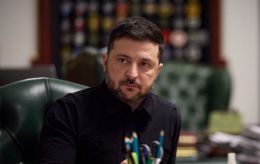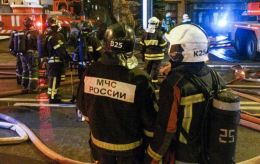Negotiations, Trump and end of war: What Zelenskyy preparing Ukraine for and what is his plan
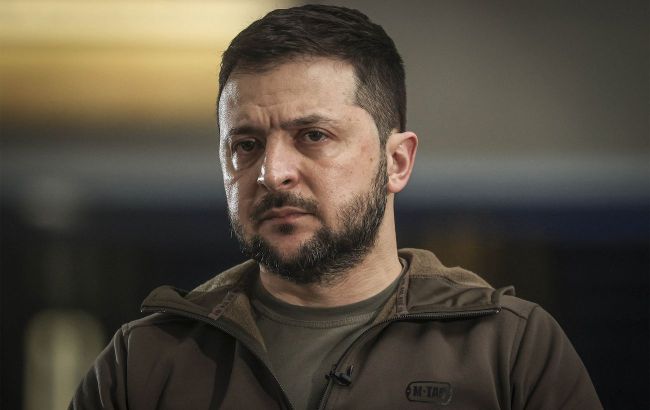 Ukrainian President Volodymyr Zelenskyy (Photo: Getty Images)
Ukrainian President Volodymyr Zelenskyy (Photo: Getty Images)
There has been a lot more talk about ending the war with Russia lately, and it is one of the central themes in the speeches of President Volodymyr Zelenskyy and his associates. For insights on how the government envisions these negotiations, what plans have been developed for the coming months, what Ukraine is ready and not ready to concede, and whether Donald Trump has a plan for Ukraine after all - in the material by RBC-Ukraine.
Content
- Why talks about negotiations started in Ukraine and where Putin miscalculated
- Importance of peace summits
- How shelling of Okhmatdyt affected "peace party" and "war party"
"In the end, everything will come down to the personal relationship between Zelenskyy and Trump," said an RBC-Ukraine government source ahead of their phone conversation on Saturday night. The call was more protocol and preparatory because of Zelenskyy and Trump's public communications. At least, according to RBC-Ukraine information, it was confirmed that Trump does not have a specific plan for Ukraine but rather a set of general theses on the subject.
On the one hand, our country evokes extremely unpleasant associations for him (recall, Trump's first impeachment began with a phone call with Zelenskyy). Still, personally, Zelenskyy is viewed with respect: he did not flee, did not panic, and actively promoted his agenda on the international stage. How this will materialize in the event of Trump's victory in the elections is still unclear.
After a short break, the Ukrainian government plans to continue working diplomatically, trying to achieve as much as possible in the coming months before the US elections in November and the inauguration of the new US president in January 2025.
In recent weeks, Zelenskyy has developed an extremely intensive external political activity during the full-scale war with Russia, even by his standards. Various summits, forums, and bilateral meetings followed one after another, sometimes without any breaks at all.
The reason for such activity is the need to solve a number of important tasks, from securing funds and weapons for Ukraine (preferably for the long term) to promoting the Ukrainian vision of ending the war, from signing bilateral security agreements to further steps towards NATO integration.
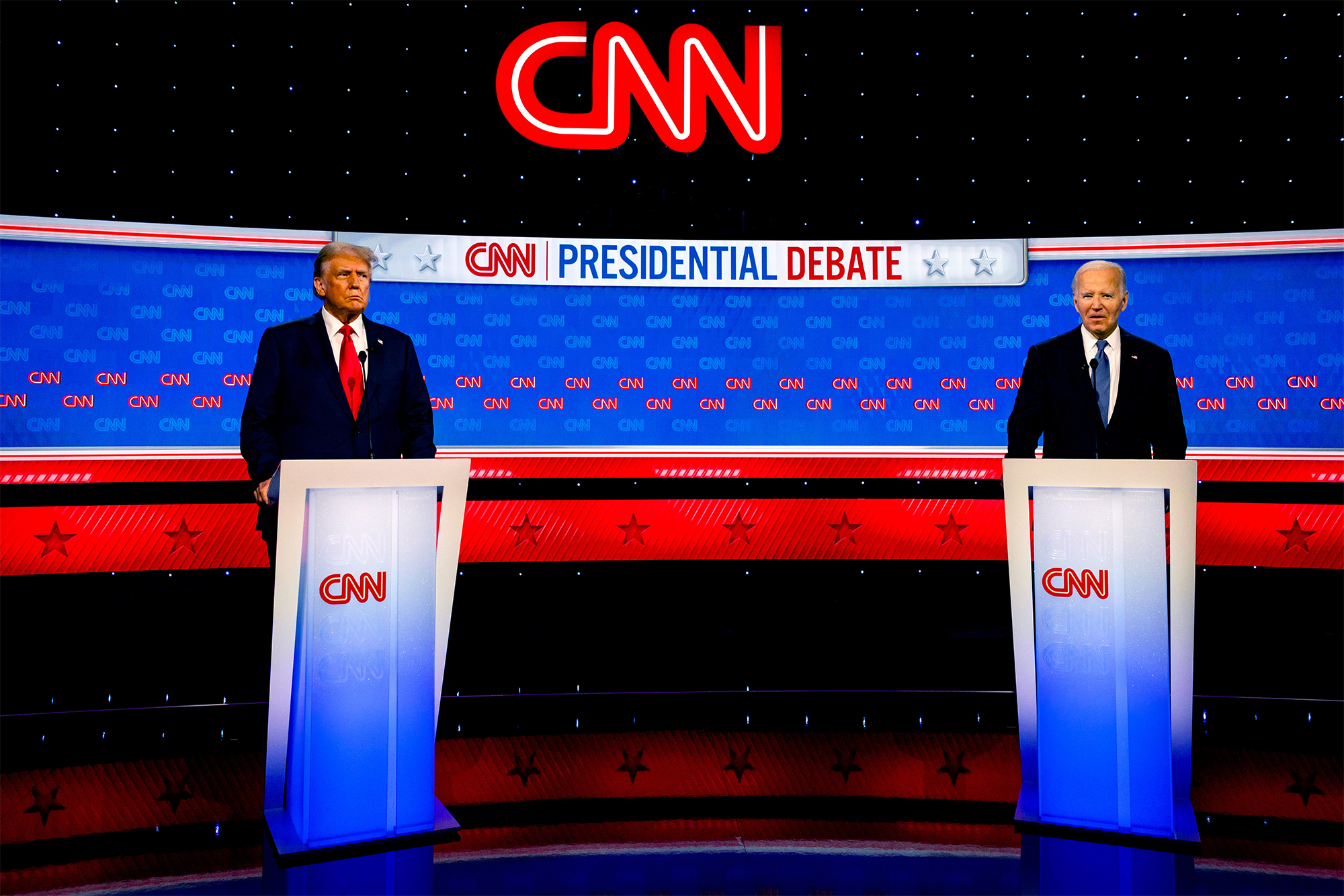
Donald Trump and Joe Biden at the debate (photo: Getty Images)
Of course, the main question regarding Trump's possible return to the White House is when and how peace negotiations with Russia might begin and in what format.
Moreover, Zelenskyy mentioned a few intriguing messages in an interview with the BBC: that the active phase of the war could end this year and that Ukraine might be able to regain some of its territories not through military means but through diplomatic ones.
Why talks about negotiations started in Ukraine and where Putin miscalculated
The word "negotiations" has recently been frequently mentioned in the Ukrainian media space. This sharply contrasts with last year, when it was practically taboo.
Although, typically, officials do not disclose details about such negotiations (when? where? with whom? in what format? about what? etc.), there is a kind of normalization of the concept itself. The Ukrainian public is accustomed to the idea that negotiations, as such, are not necessarily a bad thing, not necessarily a provocation or an enemy psychological operation.
A sociological survey by the Razumkov Center, conducted on behalf of Mirror of the week, despite drawing some criticisms, generally confirms this normalization: 44% of Ukrainians believe that the time for negotiations has come. In comparison, 35% hold the opposite opinion.
At the same time, a confident majority, 61% of the population, are against any concessions to Russia in these negotiations, and only 7.6% are ready to sacrifice part of the territory. In summary, negotiations are needed but should not involve serious concessions.
The government is broadcasting similar messages. On one hand, they emphasize the power and importance of diplomacy and the fact that victory can be achieved not only on the battlefield but also partially through negotiations. On the other hand, the priority remains to fully implement Zelenskyy's peace formula, including Ukraine's territorial integrity within the "1991 borders."
Numerous interlocutors from different structures assure RBC-Ukraine that there are no plans for territorial concessions. They also deny that the constant use of the word "negotiations" is part of a planned campaign aimed at the Ukrainian audience. "Everyone talks about 'negotiations': the West, China, the Global South, even Russia. We cannot be the only ones categorically denying this possibility," explains one source.
During the full-scale war, Ukraine has gained significant subjectivity in matters of war and peace. None of the allies are calling for peace at any cost, and no one is trying to twist Kyiv's arm and force peace—all sources at RBC-Ukraine confirm this in contact with the West. At the same time, there are many more questions about how exactly Ukraine envisions future negotiations.
As for Russia, the real plans of its leadership are naturally difficult to understand. Certain issues faced by the aggressor country are known. For instance, The Economist wrote that Russia faces a serious shortage of Soviet-era equipment and artillery barrels are overly worn due to overuse. Open sources reveal that payments for signing army contracts are constantly increasing, indicating a dwindling flow of volunteers willing to die in Ukraine. Maintaining this flow is only possible by continuously raising payments, as even pro-war Z-channels admit.
However, it's still premature to discuss the depletion of Russian resources, especially after Moscow established close cooperation with Iran and North Korea and received ongoing support from Beijing.
According to a high-ranking interlocutor at RBC-Ukraine, the aggressors still surpass Ukraine regarding resources. Hence, they are in no hurry, and their "peaceful" rhetoric is part of their overall strategy. "They plan to grind us down, disregarding their losses, hoping that sooner or later our resources will run out, while theirs will not," he says.
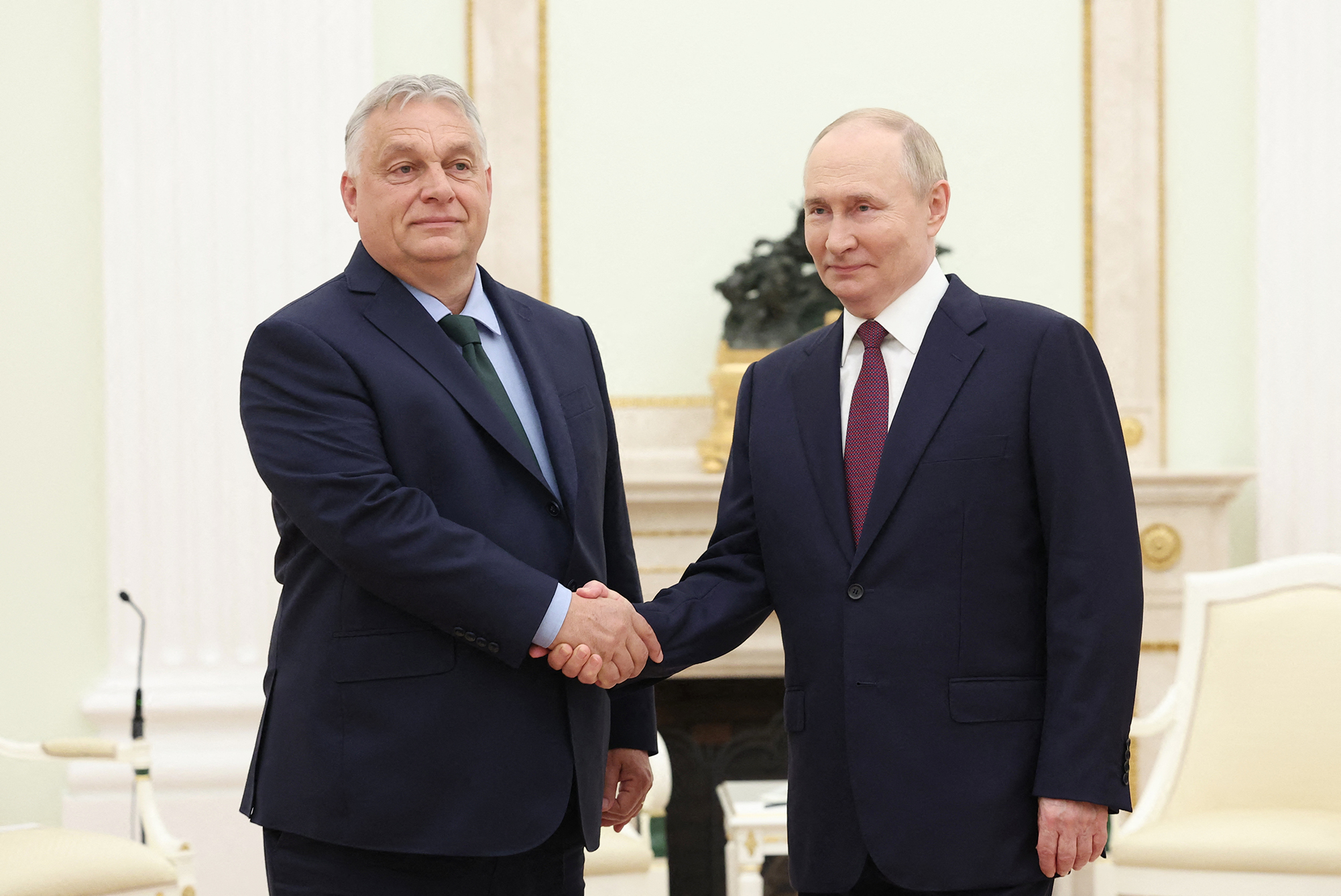
Vladimir Putin with Hungarian Prime Minister Viktor Orbán in Moscow (photo: Getty Images)
According to another source close to Zelenskyy, Russia would generally like to return to the Istanbul agreements from the spring of 2022 as a basis. Besides territorial claims, the Russians supposedly haven't given up on other "denazification-demilitarization" points: reducing the rights of the Ukrainian language in favor of Russian, reducing the Armed Forces of Ukraine, etc. At least, they planned to negotiate over these points as well.
The topic of the Russian language in his peace plan was raised by former British Prime Minister Boris Johnson, describing how he thought Donald Trump could handle the peace process after winning the election. Johnson's article has been actively discussed in Ukraine, although the political weight of the former prime minister and his influence on Trump has yet to be discovered.
According to another source, Putin, on the contrary, has noticeably narrowed the list of demands and will not play with cultural-humanitarian issues. "There will be three points on the table: NATO membership, territories, and money, specifically the frozen Russian assets. Our task is to secure our positions on each of these points as best as possible," he says.
In turn, Russia could potentially agree to a ceasefire, but on the condition that it recognizes the already occupied territories. For Ukraine, this is a so-called non-starter – an inherently impossible proposal.
"If our partners manage to 'soften' this to a ceasefire without any conditions, then we will face very strong pressure from all sides," he explains.
At the same time, Ukraine is aided by Russian diplomatic mistakes – this is acknowledged by sources both in Ukraine and in Western circles. For instance, Russia's outright refusal to participate in the peace summits initiated by Zelenskyy has given Ukraine a significant advantage: after all, who can blame us for not inviting the Russians to the summit if they themselves refuse?!
Putin's outrageous demands, voiced right before the summit in Switzerland (in short: Ukraine must give up Kherson and Zaporizhzhia), also played against Moscow. The obvious impossibility of such demands is well understood by everyone, including countries of the Global South, which generally have a normal attitude toward Russia.
As for Ukraine's plans for the next few months, as described by the authorities, they will focus on several directions, with an obvious and understandable priority on international relations.
Importance of peace summits
Preparations for the second peace summit will soon be underway. Ideally, it should be organized as quickly as possible, before Trump takes office or even before the November elections. President Zelenskyy has publicly outlined some stages on this path, including holding international thematic meetings at the level of national security advisors on specific points of the peace formula agreed upon at the first summit in Switzerland.
According to RBC-Ukraine, among all the countries that signed that communiqué, a group of several countries with significant international weight will be determined for various points of the "Zelenskyy formula," which will further pressure Moscow to agree with this plan. All interlocutors acknowledge that it is generally possible, though not easy, to reach agreements on issues such as the exchange of prisoners or free navigation. However, what to do about points on which Ukraine and Russia have opposing positions, such as punishing the Kremlin's leadership for aggression or controlling territories, remains unclear. In any case, the further Ukraine can advance in implementing the peace formula before Trump takes office, the stronger our positions will be.
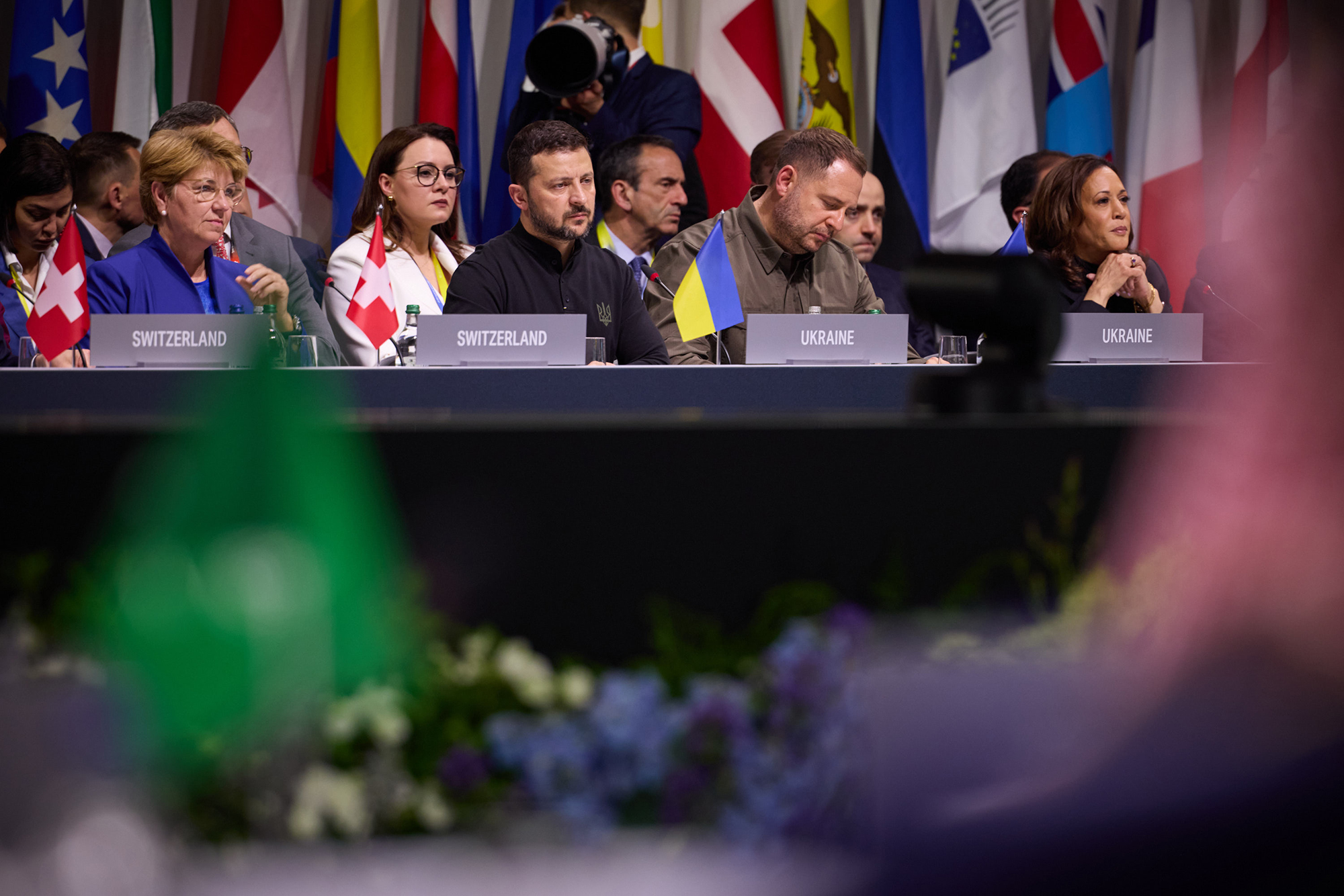
Peace summit in Switzerland (photo: Office of the President)
A crucial point is that there is no talk of direct bilateral negotiations and agreements with the Russians; such an option is categorically rejected and even deemed impossible. Obviously, any agreements are only possible through intermediaries—Zelenskyy has already drawn parallels with the grain deal, where Turkey and the UN acted as such intermediaries.
In any case, Ukraine will have to deal with the current White House administration in the coming months. Like Trump, it does not seem that Biden's team has its plan for Ukraine. At least, repeated Republican demands to publish a strategy for Ukraine have had no effect. Everything boils down to "escalation management"—a method by which Ukraine is provided with just enough weapons under such conditions that it does not lead to an excessively sharp reaction from Moscow.
In two and a half years of the large-scale war, Ukraine has managed to lift many American red lines (it's enough to remember that the transfer of Patriot systems to us was once considered fantastical and impossible). One of the last major tasks in this direction is to lift the ban on strikes on Russian rear areas with American weapons, which would significantly impact the situation on the battlefield.
Interlocutors from RBC-Ukraine express restrained optimism and hope that the ban will eventually be lifted—though not very soon.
Overall, Biden's team currently has many other problems besides Ukraine, the main one being replacing the candidate in the elections. Potentially, Biden's decision to withdraw from the race could benefit Ukraine—without the burden of the campaign on his shoulders, the US president could make several necessary decisions for Ukraine before the end of his term.
How shelling of Okhmatdyt affected "peace party" and "war party"
Even amidst constant Russian attacks, some tragedies draw attention to Ukraine, albeit much less than before. A recent example is the shelling of the children's hospital Okhmatdyt two weeks ago.
"The political circles in the West reacted to the Okhmatdyt incident, and we, on our part, also reported it to everyone we could. However, the media, except for the British, reacted weakly. There is no 'Bucha effect,' but there is some impact. After such tragedies, various 'de-escalators' who try to explain why we are not given this or that look completely absurd," says an interlocutor in the presidential entourage.
For Ukrainian society, Okhmatdyt undoubtedly had a much more substantial impact. The interlocutor notes that the so-called "peace party" positions weakened, while the "war party" gained additional arguments.
The quotation marks around the word "parties" are not accidental—the boundaries of those who are conditionally "for war until victory" and "for peace so that children do not die" do not always coincide with formal political lines. Supporters of "peace," or rather "negotiations," exist even in the president's party.
However, as expected, the representatives of the former Opposition Platform—For Life (OPFL) are the most in favor of negotiations. The ruling party even suspects them of a coordinated media campaign in which several well-known apolitical Instagram bloggers suddenly came out with very similar and clearly not self-written theses about the need to "end the war at any cost."
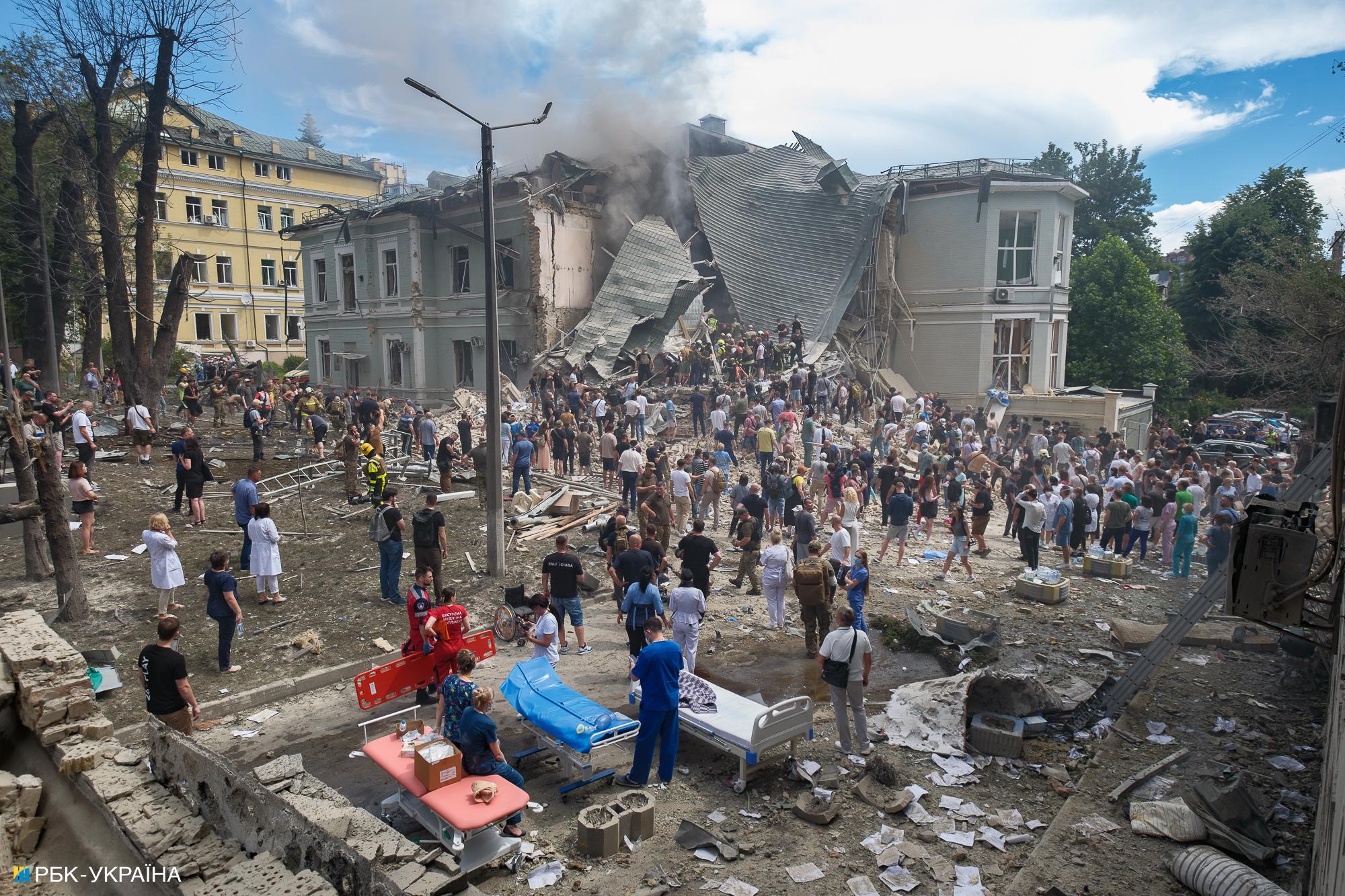
Consequences of the Russian shelling of Okhmatdyt (photo: Vitalii Nosach, RBC-Ukraine)
On the other hand, even among active military personnel, many would probably support at least some kind of truce or ceasefire. Conversely, passionate units with high media influence will loudly and categorically oppose any hypothetical concessions to the aggressors.
As RBC-Ukraine understood after talking to numerous representatives, the government does not have a single, clear plan of action for ending the war and negotiating in the near future. However, there is a common understanding of the direction to take to be in the best position when it comes time to sit down at the table and negotiate.
Besides preparing for winter (how Ukraine will get through the heating season largely depends on future Russian attacks on energy infrastructure), international activities, progress on the "peace summit" front, and establishing connections with Trump and his entourage remain priorities.
Still, there is no clear understanding of when and how the war might end. This is not surprising—many factors remain unknown.
Although Zelenskyy publicly states what almost all Ukrainians agree on, no one wants this war to drag on for another decade. Therefore, eventually, agreements will have to be made, and next year seems the most likely option for now.
"Even with the borders, the issue can be resolved de facto because it is rational. The most challenging thing is for Russia to recognize our existence as a separate entity, the very fact that we exist, and we have the right to determine our destiny. As they recognize this for the Germans, the Finns, and even the Georgians—no one would say they are 'one people' with Russians. This is the most problematic issue because it is irrational," concludes an RBC-Ukraine interlocutor in Zelenskyy's team.
